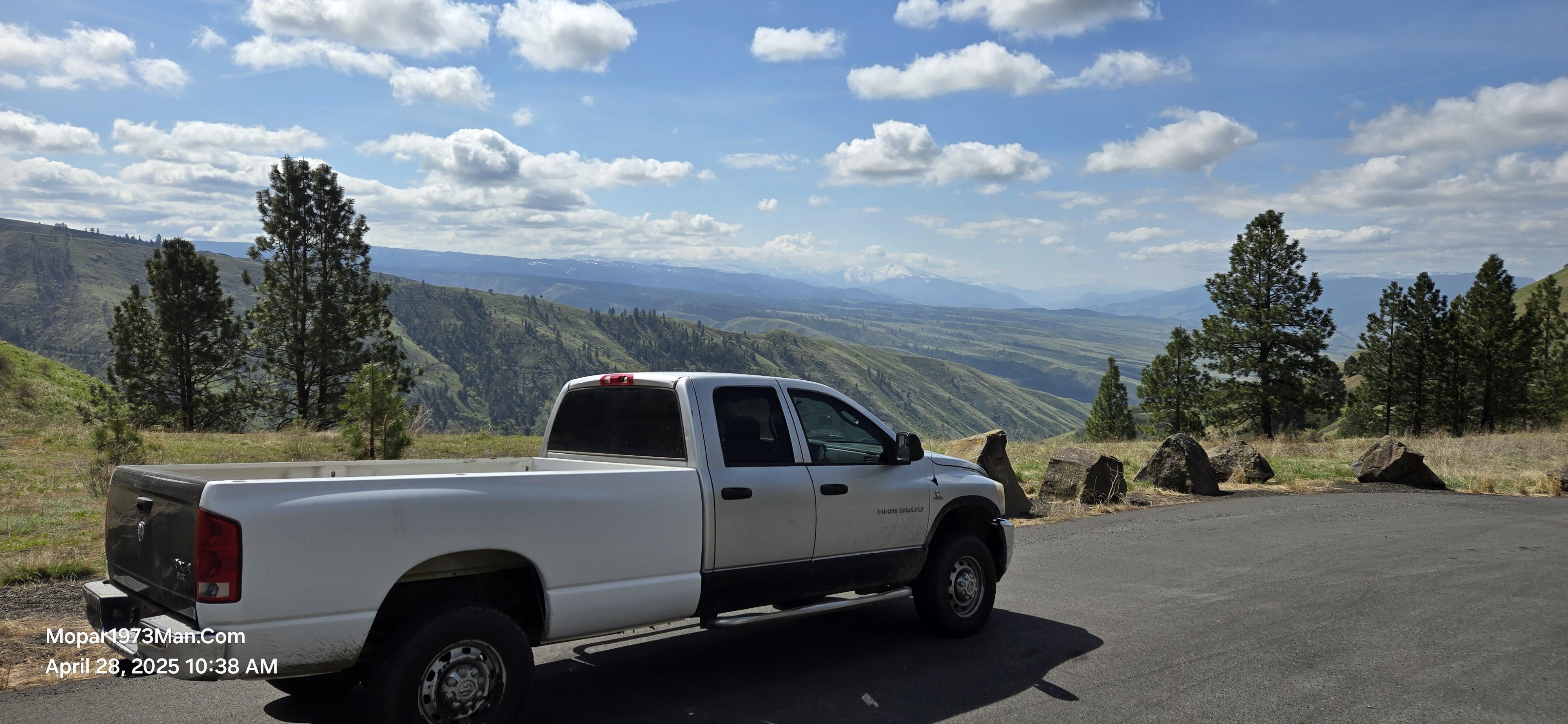
Everything posted by Mopar1973Man
-
A Congressman who actually makes sense.
Great make or break for a civil war because it really could get that bad... You got to remember this includes both the doctors, the citzens, taxation and how the illegal aliens get a free ride. Oh yeah you got to remember the gov't is exempt for these rules... They will only get the best!
-
A Congressman who actually makes sense.
Here you go...
-
overdrive problem
Well it looks like you might consider looking in the bone yards for a wreck truck in better condition than your own and swap the electrical completely over... Taz's truck is bad but not that bad... It seems that all the older truck tend to get completely abused and hacked up trying to fix the problems...
-
overdrive problem
5 Speed final ratio 0.75:1 6 Speed final ratio 0.73:1 So either trans will twist about the same but ISX is right 3rd, 4th and 5th have some good overlap for trailer hauling. But here is the problem... New Venture the produces of our trannies (5 and 6 speeds) went out of business... The 6 speed series was produced very much and when the parts dry up that it there will be no more made for the 6 speed. But as for the 5 speed there was several models made for the Big 3... so as for the 5 speed parts are starting to be produced by aftermarket companies... Here is a article from Quad 4x4 site.
-
overdrive problem
That is the ABS computer and other stuff (water fuel light etc) I know you can disconnect it but the ABS function is completely lost then. so if you hook it up and the ABS light is stuck on the ABS dump valve is on the rear frame near the axle. Taz has also a 92 Dodge with thesame thing... ---------- Post added at 08:50 AM ---------- Previous post was at 08:44 AM ---------- Makes me wonder if the crank sensor is your cause... Because if the crank sensor fails the tach will die or report bad information, and since the alternator is based on the crank sensor to activate the alternator field I would start there because if the voltage drops low the computers PCM and ABS will act really strange and weird.
-
Unexpected results from new VP44
That truely is sad maybe there get it right yet... It looks to be a good solid pump design but just poorly laid out now..
-
Help! No water temp, oil pressure, or tach. ECM failure?
Make sure you disconnect again and do the APPS calibation procedure... Because anytime you pull the batteries you wipe out the APPS setting... The error code will remain for 40 warm up cycles. The CEL light normally goes out in 3-5 key cycles. This information is all stored in non-volatile memory so you could basically disconnect the batteeries for 10 years and the codes will be there again after 10 years... ---------- Post added at 08:35 AM ---------- Previous post was at 08:30 AM ---------- As for you post... Comment in blue...
-
AirDog
So does the AD 150 but it just a bit messy to adjust it... I use a washer and shim up the spring... I'm running about 17-17.5 PSI @ idle, 16 PSI at 65-75 MPH and 15 @ WOT... After setting it up once I've never had to adjust it again...
-
BHAF filters...
Now test your filter minder now and then and you'll see the how light of a suction is needed to pull the filter minder down... I'm still waiting for my filter just quit and suck the filter minder down but it just won't die.
-
Gomma bite the bullet I guess
Tell you the truth you not doing to bad for use metal and a paint job really... For $4,200 it cost my insurance to fix my truck your doing good... I felt really bad when I pull a small tree over on my truck wiping the passenger mirror off, breaking the windshield, denting the top forward corner of the main door, denting the rear quad door, and littering the roof and hood with dents from pine cone fall out. http://forum.mopar1973man.com/attachment.php?attachmentid=226 http://forum.mopar1973man.com/attachment.php?attachmentid=227 I've done this a million time before with good results but this time the tree got revenge on the Cummins! So Really I think you doing good for the price...
-
A Congressman who actually makes sense.
He's right... This is all wrong... so far Idaho has made a good stand but i hope the rest of American follows and tell BO where he can stick it.
-
Welcome to my World
I wish you all where there when I had to comdemn my 1972 Dodge Ram W350. I had the worst luck with snapping the front axle all the time and the axle was only made for 1/2 a year so find part was expensive and insane priced. Well after hanging around other forums I think I know the cause of my problem know but I no longer have the truck. But now in hind sight I learn basically all failures have a reason and a cause like JL Welding here with the pump. But the tough part is now the answer. The answer is not obvious other that that we could of helped him fix it... But some where down the road we will find it.
-
Tractor Forum Got a Face Lift
Not a problem I believe in "Link Love"...
-
AirDog
Gauge pod you get from Autometer or a Autometer dealer. As for the AD 165 I think those don't require a draw straw unless you got intank pump.
-
Welcome to my World
Oh Geez... Come on JL... You know better about fittings and torque... I called you anyway to see what the heck was up with you...
-
dyno day
Man I wish... I would love like hell to show up and run the rollers but I just don't have the money to drive all the way out there... Good luck to the rest of you you got to post up a copy of the dyno sheet on the performance areas though!
-
New diesel toy on order
Nice... At least its a diesel... I would love to have small tract like that so I could do some land scaping and dirt moving and make the yard the way I want it...
-
tcc lock up???
Ok... Now does it do this without the cruise set? Funny feeling the PCM is at fault... (Cruise control)
-
Help! No water temp, oil pressure, or tach. ECM failure?
Try the cluster testing... http://mopar.mopar1973man.com/cummins/2ndgen24v/cluster/cluster.htm
-
Big thumbs up for Moparmans state
The reason why it doesn't bother me is because the sole fact is if you not hearty enough to live in the back country and be a long way from a big city you not going to make it. There is no cell phones here, no FM radio really, no coffe shop (starbucks), etc. Just miles and miles of wilderness. Maybe that why... When I quit the fire dept I switched hats from fire fighter to Idaho Co. Search and Rescue. Yeah this is what Idaho all about... This is only 4-5 straight line to the highway but there is no big cities, no nothing. Place like these your on your own. There is no cell signal to call for help, even our fire/police radios couldn't reach a repeater tower, and then it might take a skilled ATV rider at least half a day to get out of here. (Notice in the second pic there is no trail or orad anywhere) There is no roads to follow back.
-
Diesel fuel...
Hey Gang... I got ahold of the local fuel station owner and going to see what information I can get about diesel fuel and the quality and testing the fuel must meet... He said he would look up the shipping invoice and see if he could find any information about pourt point, HFRR, and othe good information. Lets see where this goes...
-
tcc lock up???
Hmmm... Just replace the brake light switch since there is no way I know of to adjust the switch... Now is the APPS sensor still showing this .4 volt change all the time or only randomly?
-
Big thumbs up for Moparmans state
Lots of places... Just happens to be the two local real estate office in Riggins, ID http://www.blevinsrealestate.com/ http://www.salmonriverrealty.com/
-
tcc lock up???
Another one I thought of that could be a issue is the brake light switch. This controls locking/unlocking of the TC. I've heard where a lazy pedal could be just enough weight to trip (flicker the brake lights) and cause this lock.unlock weirdness.
-
Over flow valve
Hmmm... Now the fact of the old Edge box was mess up that give a bit of light to the fact of a possible short or simular cause a excessive current draw or loading of the pump. Anything is possible... But I glad to talk to others about the welding issues to verify the thought... As for the overflow valve it doesn't open till 14 PSI so i'm starting to suggest the 14 PSI as a minimum pressure to help in cooling the electronics and keeping the pump happy longer... There is no proof of this yet but I can say my pump is 113K miles and doing good...



